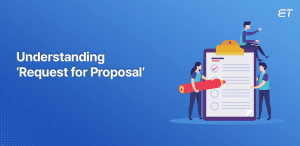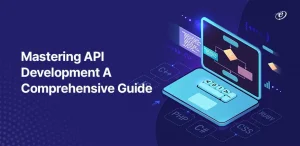The proliferation of consumer mobile applications in the past decade has had an exceedingly positive impact on people’s lives. From shopping to learning, telemedicine, social media, entertainment, and productivity, consumer mobile apps have helped their users do more with less and in turn, lead more fulfilling lives.
Enterprise applications similarly act as force-multipliers for businesses of varying sizes, helping them run things like clockwork and manage diverse processes simultaneously. This helps businesses save time, money, and gain a competitive edge over their peers.
But that is where the similarities between the two end. Not only have enterprise applications existed for a lot longer but they are also much more complex than consumer applications.
What is an Enterprise Application?
To put it simply, an enterprise application is any software that enables your business to do things more efficiently. To this end, it can refer to managing your payrolls, automating repetitive tasks, using AI and data analytics to streamline various operations, increasing employee engagement, and hundreds of other business operations.
Enterprise applications can be standalone web-based programs, enterprise mobile applications, or a combination of both that allows your employees to seamlessly switch from a stationary to a mobile workstation. In case of the latter, the enterprise mobility solution can be a mobile version of the web-based software or a fully original implementation to help solve specific issues.
By going in for enterprise mobile app development, you can positively impact your business’s communication, sales, revenue, and competitiveness by simplifying your processes and increasing your employees’ productivity.
Also read : .NET for Enterprise App Development
What are Different Types of Enterprise Application Software?
An enterprise application is a bespoke software solution that you can build to better manage any task or process. Logically, this follows that there can be as many types of enterprise applications as there are business processes. However, you can classify these various types of enterprise software as per the level at which they are deployed in your organization.
Employee Level
These enterprise apps are the most basic of the lot and comprise only the most essential features required for specific purposes. Employee-level enterprise apps are also exclusively used within the organization and enable various stakeholders to carry out their tasks efficiently. For instance, such an app can help your project manager manage and execute a project successfully and on-time.
Department Level
These enterprise applications are more advanced than their employee-level counterparts, both in terms of features as well as user-access. For instance, your customers can access these apps to maintain contact with your employees from a specific department (sales, marketing, customer support etc.). That apart, these enterprise apps also serve department-level requirements and help optimize internal workflows.
Enterprise Level
These enterprise apps provide an enterprise-wide platform that all your different departments can plug into. Enterprise-level apps foster communication channels between employees across the board and also host/control access to vital databases, documents, and other information of your business. Because of the sensitive nature of such information and processes, access to enterprise-level apps is regulated and varies as per an employee’s designation.
Some popularly-used enterprise applications across these broad categories include,
|
|
What are the Benefits of Enterprise App Development?
Enterprise applications, web-based as well as mobile apps, are designed and built for the sole purpose of helping your business increase revenue by automating redundant tasks and increasing productivity per employee. Additionally, with mobile apps, enterprise mobile app development helps you leverage benefits such as portability, seamless integration with other applications and devices, and high-level security.
Focus on business-critical tasks
Enterprise mobile applications make your employees more productive by reducing time wastage and automating labor-intensive tasks. The latter also eliminates human error issues and allows your employees to devote their time and energy to business-critical tasks and goals.
Efficient transaction/payment management
Enterprise mobile apps let you manage all aspects of payments/transactions efficiently, including sending payment deadline reminders, push notifications, and integrating different payment features in keeping with your larger business goals.
On-the-go reporting/analytics
An enterprise mobility solution helps decision-makers in your organization keep track of their reportees via their phones. Data generated by your employees is recorded, analyzed, and visualized through the mobile app, which helps you evaluate and edit the data while on the move.
Easier data management
While data is the most important asset for businesses, managing it is also incredibly tedious. But with an enterprise mobile application, you can carry out various data management processes such as collection, verification, correction, and analysis with relative ease and efficiency.
Supply chain control
If your business maintains a supply chain, a custom enterprise mobile app can help you drastically streamline and enhance your operations. The app can be built with different features such as fleet management, warehouse management, and transportation management to help you manage the entire supply chain via a mobile device.
Read More: What is Digital Transformation & How Can You Achieve It?
What You Should Know Before Going for Enterprise App Development?
The benefits outlined above cut across industries and can put your business well on the path to greater productivity and profits. Having said that, there are a few things you should be mindful of before investing in an enterprise mobility solution. These include,
Have a clear goal
The importance of having a clear cut goal for your enterprise application development process cannot be overstated. Write down what problem(s) your new enterprise app will solve and what other benefits/costs it will bring to your organization. If the app will also be accessed by your customers, figure out what services and solutions it will offer. Lastly, if the app is exclusively meant for your employees, bring them on-board as stakeholders and consider their needs, preferences, and constraints.
Get the technology right
Selecting the right technology stack for your enterprise application can be a make or break decision. Technology trends change by the minute and since shifting to a different stack is more laborious and expensive for enterprise applications, picking a technology that remains relevant for the foreseeable future becomes doubly important. If you’re working with an enterprise mobile app development company, you can consult them about your various technology stack options.
Third-party software integration
The success of your enterprise app development initiative also depends upon the third-party apps you use. While it’s possible to develop all necessary features of such apps on your own, there are instances when going for a third-party software integration makes more sense. With the right third-party apps, your enterprise application can help you achieve your goals in a timely and cost-effective manner.
User experience
The development of a user-friendly enterprise application is just the first step in your enterprise app development journey. To realize the full potential of your app, you need to invest in training your workforce to use the app and adjusting your administration and control policy for mobile devices. The shift, as such, is as much cultural as it’s technological.
Security is paramount
Ensuring the security of your business data as it’s stored, transferred, and used by different stakeholders via the enterprise application is of utmost importance. Since your employees will use your enterprise app on their devices, there’s also a need to ring-fence your business data through additional security measures.
Read More: Why Medium Scale Enterprises Should Ditch Spreadsheets for Data Analytics?
Over to You
Today, companies across the revenue and industry spectrum are taking to enterprise applications for managing critical processes. And with benefits such as data-driven business insights, enhanced collaboration, greater efficiency, and lowered risk, the question of whether you should invest in an enterprise application becomes a no-brainer.
If you’d like to know more about enterprise applications and how they can be customized to make your business processes more cost-effective, get in touch with us now. As an enterprise app development company for close to two decades, we’ve built robust web and mobility solutions for large enterprises and medium-to-small businesses across North America, Europe, and Asia-Pacific.
Hire dedicated developer for your enterprise applications will walk you through the development process and suggest a suitable technology stack and timeframe for building your enterprise app.
Thank you for reading! If you liked this post, do subscribe to get crisp and informative blog posts delivered straight to your inbox every week. Our posts touch a variety of topics including web and mobile development, data analytics, business intelligence, and eCommerce.
Digital Marketing Manager
Responsible for developing and managing web presence, Sarah has been associated with eLuminous Technologies for 7+ years. Strategic and innovative with a passion for Content Marketing and enhancing brand awareness. Administered all business marketing operations and advertisement campaigns that eventually increased web traffic. She works under the motto “Think like a Publisher, not a Marketer.”



